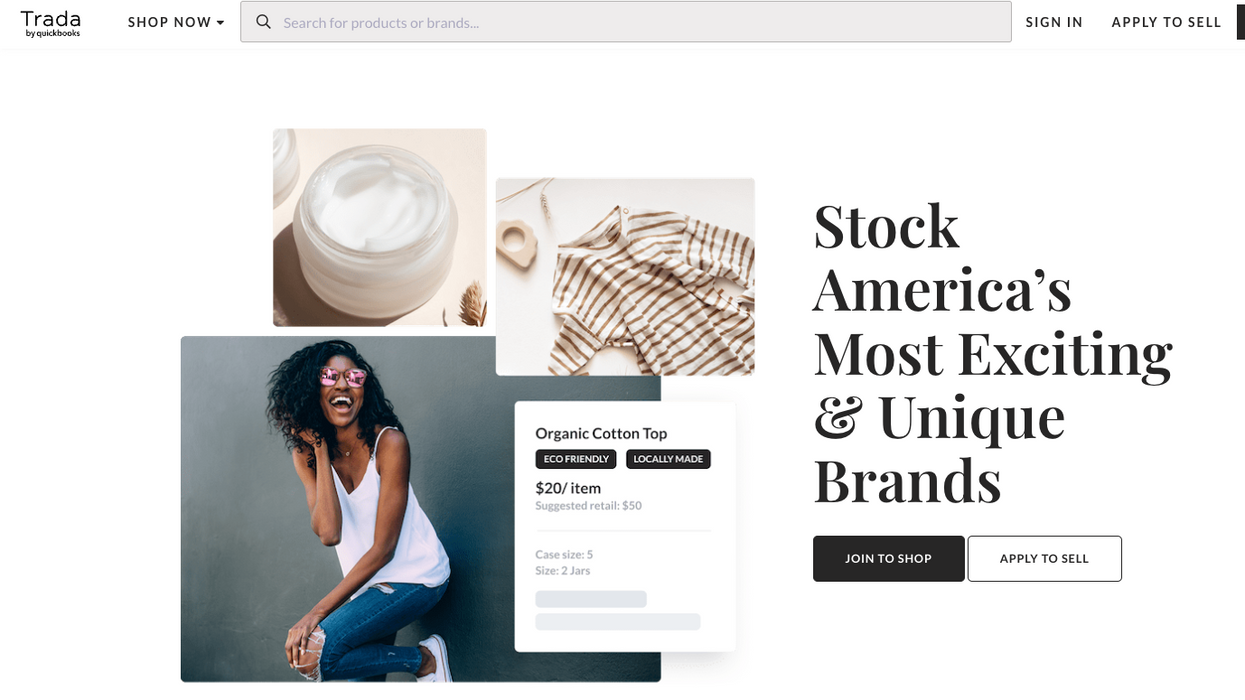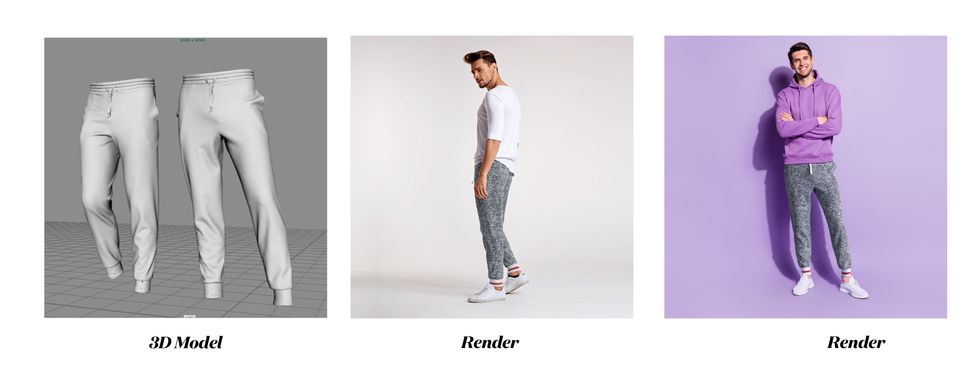Retail Channels
12 August 2022
QuickBooks launches a wholesale marketplace for small businesses
B2B ecommerce platform Trada by QuickBooks is connecting suppliers and retailers.

QuickBooks is entering ecommerce.
B2B ecommerce platform Trada by QuickBooks is connecting suppliers and retailers.

QuickBooks is entering ecommerce.
Intuit QuickBooks provides software to help manage a small business. With a new B2B ecommerce marketplace, it is taking a big step on a journey to becoming a platform that connects businesses with each other, and facilitates buying and selling between them.
Trada by Quickbooks is a wholesale marketplace that offers suppliers and brands a place to showcase and ultimately secure orders from retailers who are interested in bringing them into their stores.
With the marketplace, QuickBooks seeks to apply the ecommerce principles and experiences that are familiar in consumer-facing online shopping to the process in which retailers obtain the goods that they sell in their stores. Under the wholesale model, suppliers ultimately want to find and build a customer base, but they reach people through the destination stores of retailers, who by turn are seeking suppliers that have great products. This creates challenges: Sellers are seeking to get in front of retailers, while retailers want to be able to easily access a selection of unique products.
“We launched Trada by QuickBooks to give wholesale suppliers and retailers a platform to discover each other, connect, and place orders on the marketplace, thereby digitizing their traditional manual and expensive wholesale sourcing and purchase process,” Shilpa Reddy, VP and general manager of QuickBooks Commerce at Intuit.
While QuickBooks initially gained wide use by offering software to help businesses manage their books, it has grown over the last 25 years into a platform that aims to simplify financial complexities and serve as a “single source of truth” for small businesses. It previously launched an integration to manage ecommerce. Now, it is providing a venue for ecommerce to take place.
“Our focus is to provide an end-to-end platform that helps small businesses manage every aspect of their business, from finding new customers to managing finances to getting paid and having access to capital to paying employees,” Reddy said. “As we looked across our platform and how we could further support product-based businesses, we realized there aren’t many options to connect small businesses within the B2B space. Launching a B2B marketplace not only helps small businesses thrive, it delivers on our commitment to provide an end-to-end platform and helps product-based sellers and retail businesses easily implement a wholesale strategy.”
Available to logged-in users of QuickBooks, Trada aims to make it easy for sellers to get started by sharing their catalog, then set up an experience that is similar to a storefront in a consumer-facing marketplace.
“Sellers are able to showcase their products with a beautiful storefront, which is tapped into by thousands of retailers looking to find items for their customers,” Reddy said. “Additionally, while setting up their storefront, sellers are encouraged to share their unique brand story to help make connections and build potential lifelong customers.”
QuickBooks also seeks to provide tools to help brands get discovered by retailers, and other businesses that are using QuickBooks. With search, users can provide specific criteria based on specifications that they are seeking, and receive customized recommendations.
“Brands are regularly highlighted on the website, on social media, and in email communications to our retailers,” Reddy said. “We also spotlight sellers through our curated collections, such as Woman-Owned, Eco-Friendly and Made in the USA, to make it easy for retailers to quickly discover new brands and stock their stores with products that align with their values and customers’ desires.”
For retailers, QuickBooks wants to offer a place where they can get access to a selection of unique products, and easily place orders with automated processing tools.
QuickBooks’ expansion underscores how ecommerce no longer has to live on a standalone website or platform. It can be embedded into experiences where interested buyers are likely to gather. At the same time, those buyers don’t necessarily have to be end consumers. They can also be other businesses that are serving different parts of the value chain. As with any two-sided marketplace, growth will be in part dependent on encouraging numbers of sellers and retailers to join the platform. With many businesses already using QuickBooks, it has a large base from which to initiate growth, as well as a built-in path for businesses to discover it.
In the end, QuickBooks wants to simplify processes for small businesses and solve problems that form barriers to growth. Ecommerce is a way to further that goal.
Amazon partnered with Hexa to provide access to a platform that creates lifelike digital images.
A 3D rendering of a toaster from Hexa and Amazon. (Courtesy photo)
Amazon sellers will be able to offer a variety of 3D visualizations on product pages through a new set of immersive tools that are debuting on Tuesday.
Through an expanded partnership with Hexa, Amazon is providing access to a workflow that allows sellers to create 3D assets and display the following:
Selllers don't need prior experience with 3D or virtual reality to use the system, according to Hexa. Amazon selling partners can upload their Amazon Standard Identification Number (ASIN) into Hexa’s content management system. Then, the system will automatically convert an image into a 3D model with AR compatibility. Amazon can then animate the images with 360-degree viewing and augmented reality, which renders digital imagery over a physical space.
Hexa’s platform uses AI to create digital twins of physical objects, including consumer goods. Over the last 24 months, Hexa worked alongside the spatial computing team at Amazon Web Services (AWS) and the imaging team at Amazon.com to build the infrastructure that provides 3D assets for the thousands of sellers that work with Amazon.
“Working with Amazon has opened up a whole new distribution channel for our partners,” said Gavin Goodvach, Hexa’s Vice President of Partnerships.
Hexa’s platform is designed to create lifelike renderings that can explored in 3D, or overlaid into photos of the physical world. It allows assets from any category to be created, ranging from furniture to jewelry to apparel.

The result is a system that allows sellers to provide a new level of personalization, said Hexa CEO Yehiel Atias. Consumers will have new opportunity see a product in a space, or what it looks like on their person.
Additionally, merchants can leverage these tools to optimize the entire funnel of a purchase. Advanced imagery allows more people to view and engage with a product during the initial shopping experience. Following the purchase, consumers who have gotten a better look at a product from all angles will be more likely to have confidence that the product matches their needs. In turn, this can reduce return rates.
While Amazon has previously introduced virtual try-on and augmented reality tools, this partnership aims to expand these capabilities beyond the name brands that often have 1P relationships with Amazon. Third-party sellers are an increasingly formidable segment of Amazon’s business, as they account for 60% of sales on the marketplace. Now, these sellers are being equipped with tools that enhance the shopping experience for everyone.
A video displaying the new capabilities is below. Amazon sellers can learn more about the platform here.
Hexa & Amazon - 3D Production Powerhousewww.youtube.com